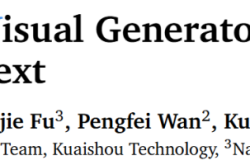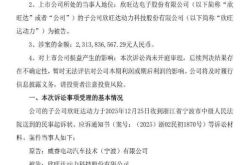Idle Fish charges commissions, sellers flee
![]() 08/16 2024
08/16 2024
![]() 510
510

Commission fees are just the fuse
Written by Li Xuanqi
Edited by Li Jinlin
Typeset by Annalee
Recently, Idle Fish announced that it will charge all sellers a basic software service fee of 0.6% (with a maximum single transaction fee of 60 yuan). The new rule will take effect on August 9 and be officially implemented on September 1.
If Idle Fish began charging commissions from professional sellers a year ago without affecting individual sellers, the implementation of this new rule has caused quite a stir, with many sellers openly expressing dissatisfaction and even voting with their feet, declaring their intention to "leave Idle Fish".
For a long time, Idle Fish was positioned within Alibaba as "close to money but far from making money." However, in the eyes of many Idle Fish sellers, it has now become a "paid software".
Over the past year, more than 100 million people have listed idle items on Idle Fish, with over 4 million idle items posted daily. In the past year alone, 30 million new users born after 1995 joined Idle Fish. Idle Fish has gradually become a "treasure trove," and monetizing traffic seems like a natural progression. However, when sellers "flee" or pass on costs by raising prices, who ultimately pays the price?
Crossing the river and dismantling the bridge, saying goodbye to the free era
At the end of 2018, Chen Weiye, the founder of Idle Fish, stated, "I can't disclose the specific profit model of Idle Fish, but we definitely won't charge transaction commissions." However, five years later, Idle Fish embarked on a path of charging commissions.
In June 2023, Idle Fish announced a fee policy for specific merchants. According to the official policy, if a user's monthly transaction volume exceeds 10 orders with a cumulative transaction amount exceeding 10,000 yuan, a service fee of 1% of the actual transaction amount will be charged for the excess portion of each order.
However, it may not be fair to ridicule Idle Fish for going back on its word. In just five years, much has changed. Idle Fish has undergone several changes in leadership, and its user base has continued to expand. Small B-end sellers have gradually become the main contributors to GMV growth. None of this could have been precisely predicted by Chen Weiye.
After all, before 2019, Idle Fish did not welcome professional sellers. Those found to be factory direct sellers, offline store merchants, or players engaging in "one-click dropshipping" would be banned outright. However, around 2020, changes began to take place. Changes in management led to a shift in the model, and Idle Fish gradually transitioned from a pure C2C to a hybrid C2C and B2C model. As a result, a large number of professional sellers emerged.
Therefore, when Idle Fish bid farewell to the free era last year, many people expressed support. At that time, Idle Fish mainly charged fees from professional sellers with "high-frequency and high-value" transactions, which was a positive signal for individual sellers and beneficial to buyer experience.
However, in the "Idle Fish Seller Software Service Fee Charging Rules" released at the end of July this year, Idle Fish further expanded its charging targets. A corresponding service fee will be charged for each transaction completed on Idle Fish, based on the actual transaction amount (including shipping fees) at a rate of 0.6% (with a maximum single transaction fee of 60 yuan). Additionally, if a refund occurs, the service fee will not be refunded.
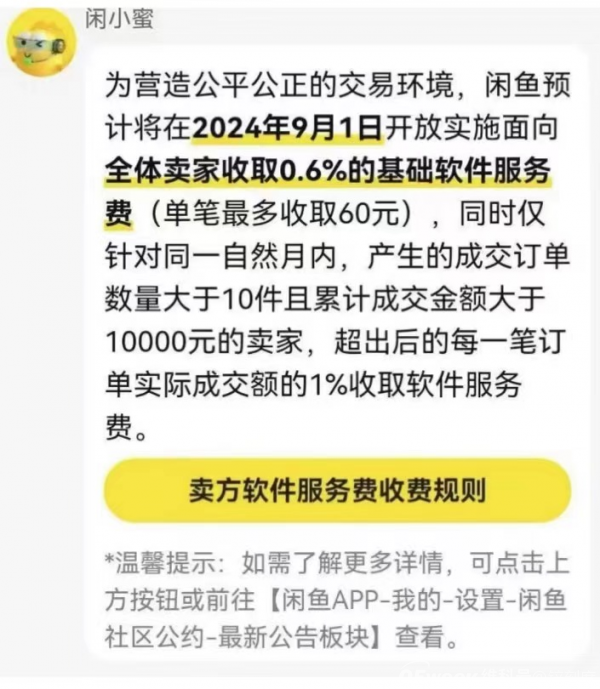
On March 12th of this year, Idle Fish announced that its daily transaction volume had exceeded 1 billion yuan. Based on this calculation, after the implementation of the new fee policy, Idle Fish could potentially collect at least 6 million yuan in software service fees per day.
Idle Fish officials stated that the fees are intended to ensure the continuous provision of related services and continuously optimize service quality and product functionality. After charging fees, Idle Fish promises to increase investment in upgrading platform services such as product verification and logistics speed to reward seller support.
However, based on discussions on social media platforms like Xiaohongshu and Weibo, many sellers expressed dissatisfaction this time around. "Do I need to pay a handling fee for selling idle items?"
In fact, many second-hand trading platforms, such as Zhuanzhuan, Papai, Aihuishou, Ganji, 58.com, and Guazi Second-hand Cars, charge sellers or buyers certain fees. While Idle Fish charging all sellers is not exceptional, a closer look at individual sellers' discussions reveals that their primary concern is that "while handling fees are acceptable, platform services should also improve accordingly." Some netizens mentioned, "Scams are completely ignored... If services and security measures cannot be improved, why should we pay fees?" Other sellers noted, "It's getting harder and harder to sell things, traffic is dwindling, and now there are fees."
It is evident that Idle Fish's commission charges are just the fuse, igniting long-standing issues: low entry barriers for sellers, ongoing transaction scams, and low trust between buyers and sellers.
Platform policies, seller strategies
"Don't sympathize with the platform's handling fees, okay?" After Idle Fish's new fee policy was announced, a netizen posted on Xiaohongshu, "Don't say it only affects professional sellers and not ordinary people. At first glance, each transaction may only cost a few cents, but they add up over time."
According to the screenshots posted by the netizen, they were charged Idle Fish software service fees ranging from a few dozen yuan to as much as forty or fifty yuan per month. They expressed, "I'm broke, and I care about this latte money. This is based on how much Idle Fish charges per month after reaching a certain threshold. Starting September 1st, every transaction will be charged 0.6%, and I can't imagine how much I'll have to pay."
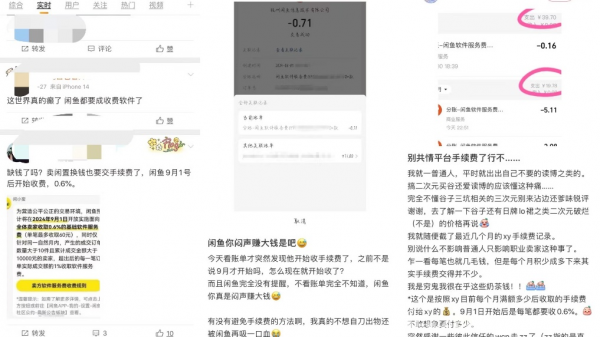
Discussions on Weibo and Xiaohongshu regarding seller sentiments
On Weibo, many users also expressed their disapproval. "I'm selling something for five yuan, and they're still charging me a handling fee of three cents. I also have to deal with difficult customers. Goodbye." "I already have to subsidize my sales, and now they're charging me a 0.6% service fee." "Are they short on money? Selling idle items for cash also requires a handling fee?"
It's worth noting that some sellers mentioned being unfairly charged handling fees by Idle Fish recently. "I know the rules of Idle Fish, and the deductions were always normal before. Is the system malfunctioning today?" They also noted, "Large deductions occurred overnight for orders that were completed and did not meet the fee threshold long ago." Subsequently, Idle Fish responded and refunded the erroneously deducted fees.
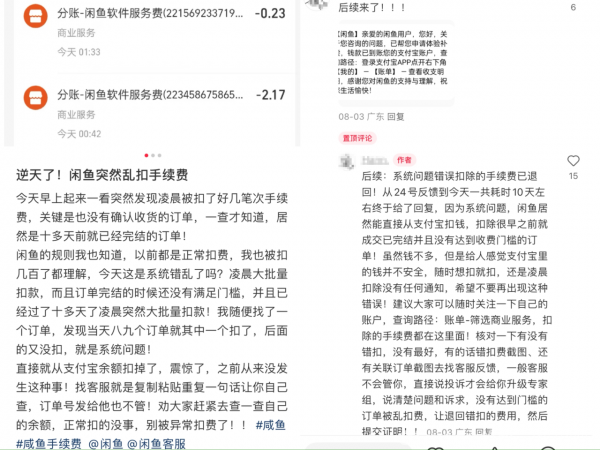
Incorrect fee deductions on Idle Fish
Under such policies, many sellers began seeking countermeasures.
On the one hand, many users tried to sell their idle items before the new policy took effect and then voted with their feet by leaving Idle Fish. According to Zink, many ordinary users are looking for alternatives to Idle Fish, with "Zhuanzhuan" and the pop culture trading community "Qiandao" being the most mentioned platforms. After Idle Fish's announcement, data from Qimai showed that downloads of Zhuanzhuan and Qiandao both experienced a small increase on Android devices. Additionally, many users selling idle items chose to move to private domains, creating idle item groups on various social media platforms to avoid platform commissions.
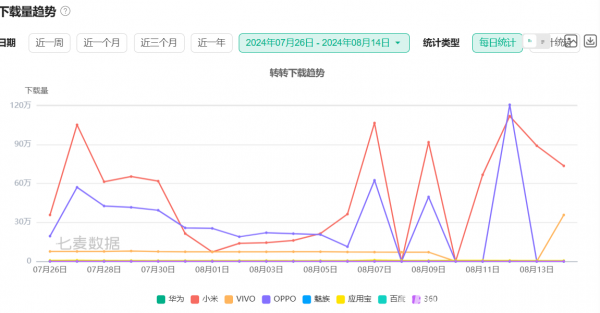
After Idle Fish's new policy was announced, Zhuanzhuan's Android downloads increased. Image source: Qimai data
On the other hand, passing costs on to buyers became another strategy. In response to a post asking, "Is there a way to avoid handling fees? I don't want to lose money on my own and then have Idle Fish take another bite," one netizen suggested, "Increase shipping or prices." When another netizen posted, "Selling a 1,200 yuan doll will cost me almost 14 yuan in fees. After seven years on Idle Fish, it's time to say goodbye to this platform," comments suggested, "Add a third of the price to shipping."
However, some sellers told Zink that increasing shipping costs while lowering prices to avoid commissions is not feasible. "The new policy charges fees based on the actual transaction amount, including shipping, so the total amount. You can only raise prices slightly to include the commission and pass it on to buyers," they explained.
Furthermore, Zink noticed that many sellers decided to join forces to boycott Idle Fish's handling fees. They stated, "If complaining doesn't work, we'll uninstall it."
Keeping a backup plan
It's worth noting that the Idle Fish software service fee preferential policy mentions, "Applicable discounts for specific transaction orders: Idle Fish will temporarily not charge software service fees for transactions generated by products posted using the 'Launch' and 'Group Buy' tools within the Idle Fish community."
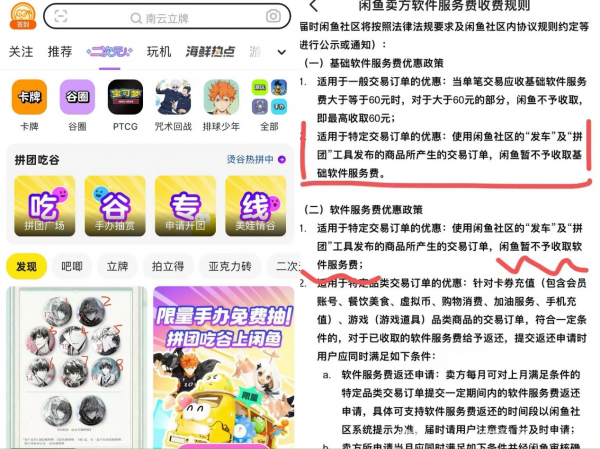
If you're familiar with the otaku trading scene, it's not difficult to see that these two Idle Fish tools primarily serve the "Goods economy." "Goods," derived from "Goods," generally refers to otaku merchandise, which first circulated among otaku enthusiasts. Different Goods are priced based on factors like quality, print run, and character IP, forming a unique pricing system within the community. They are often sold in blind box or limited edition formats. As mentioned earlier by "Hong Kong Stocks Research", the increasingly popular "group buying" consumption model has led to the launch of Idle Fish's "Group Buy" and "Group Buy Plaza" features.
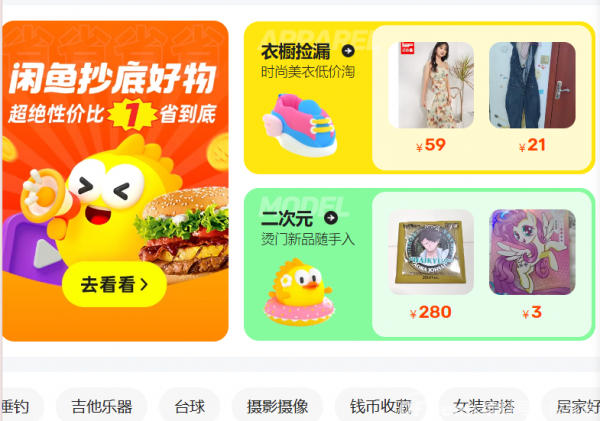
Idle Fish prioritizes otaku trading
Why did Idle Fish specifically create this "backdoor"? It may be related to changes in its positioning. At Idle Fish's tenth anniversary, Ji Shan, General Manager of Idle Fish, mentioned that the platform's positioning had shifted along with internal ecological changes, becoming a "community for young people's hobby trading" rather than just a "second-hand trading platform."
Additionally, otaku trading is becoming a significant revenue source. According to iResearch data, China's otaku industry grew by 27.6% in 2023 to reach 221.9 billion yuan, with an average annual per capita consumption exceeding 1,000 yuan. According to QuestMobile data, otaku trading on Idle Fish increased by 104% year-on-year in 2024, making it the mainstream e-commerce platform with the highest concentration of otaku content. This suggests that the otaku economy could bring new growth to Idle Fish.
Looking back at Idle Fish's changes over the past two years, since Ji Shan took office in 2022, he set a dual-wheel drive strategy for Idle Fish, combining "community" and "transaction." In May 2023, Idle Fish upgraded its "Seafood Market" and "Play" communities, relying on hobby enthusiasts to strengthen the "bond" between users. While charging service fees aims to monetize the established "treasure trove," exempting specific transactions like otaku trading from fees may not only enhance new revenue streams but also serve as a backup plan – accelerating commercialization while maintaining community tone.
However, this is a complex issue. As previously mentioned by the self-media outlet "Dao Zong You Li," some criticize Idle Fish for becoming like Xiaohongshu, while others see it resembling Taobao's version of Pinduoduo or even a hybrid of 1688 and Bilibili where you can buy products. In short, Idle Fish is no longer what it once was.
Now, as sellers unwilling to pay commissions flee, what will be left of this "four-in-one" Idle Fish?




